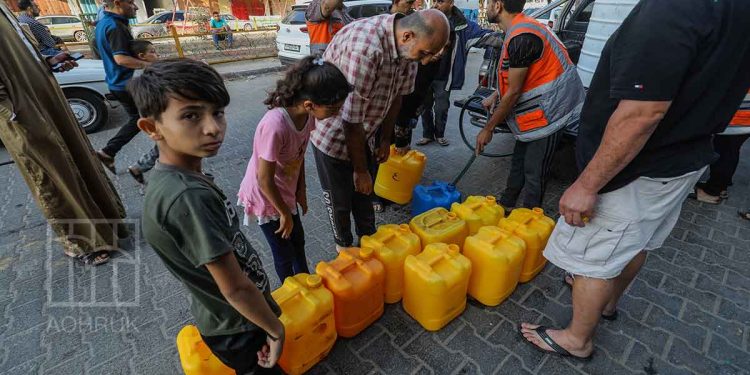As the siege and extermination war on the Gaza Strip continues, water services to the Palestinians become very little, as the United Nations Children’s Fund (UNICEF) has warned that children in the Gaza Strip do not have access to 90 per cent of their normal water use.
“water and sanitation services are at the point of collapse with large-scale disease outbreaks looming,” UNICEF said in a statement.
According to UNICEF estimates, recently displaced children in the southern Gaza Strip are accessing only 1.5 to 2 litres of water each day, well below the recommended requirements just for survival.
It explained that according to humanitarian standards, the minimum amount of water needed in an emergency is 15 litres, which includes water for drinking, washing and cooking. For survival alone, the estimated minimum is 3 litres per day.
The organisation pointed out that hundreds of thousands of internally displaced people, half of them estimated to be children, have arrived in Rafah since early December and are in desperate need of food, water, shelter, medicines, and protection.
It added that as demand continues to rise, water and sanitation systems in the city are in an extremely critical state. The resumption of hostilities, coupled with a lack of power supply, fuel shortages, restricted access, and infrastructure damage means that at least 50 per cent of WASH facilities are damaged or destroyed.
It emphasised that the impact of this on children is particularly dramatic because children are also more susceptible to dehydration, diarrhoea, disease and malnutrition, all of which can compound to present a threat to their survival.
“Concerns of waterborne diseases such as cholera and chronic diarrhoea are particularly heightened given the lack of safe water, especially following this week’s rains and flooding,” it added.
UNICEF continued, “Officials have recorded almost 20 times the monthly average of reported cases of diarrhoea among children under the age of 5, in addition to increases of cases of scabies, lice, chicken pox, skin rashes and more than 160,000 cases of acute respiratory infection.”
UNICEF Executive Director Catherine Russell said, “Access to sufficient amounts of clean water is a matter of life and death, and children in Gaza have barely a drop to drink.”
“Children and their families are having to use water from unsafe sources that are highly salinated or polluted. Without safe water, many more children will die from deprivation and disease in the coming days,” UNICEF added.
It continued, “In shelters across the Strip, long queues of exhausted women and children wait to use them, on average, one toilet for every 700 people, pushing people to resort to other coping strategies, such as the use of buckets, or open defecation”.
“Showers are even less available reducing hygiene options to nearly non-existent, impacting especially women and girls. This could further lead to an increase in the spread of disease”, UNICEF explained.
Since October 7, 2023, the Israeli occupation army has been waging an extermination war on the Gaza Strip, leaving tens of thousands dead and injured, in addition to causing massive destruction to the infrastructure and an unprecedented humanitarian catastrophe.
Since the beginning of the war, the occupation has cut off all supplies of electricity, water, fuel and food to the residents of the Gaza Strip, and bombed bakeries, factories, stores, water stations and tanks.
The Israeli aggression on the Gaza Strip constitutes a flagrant violation of international humanitarian law and human rights, as it exposes the lives and property of civilians to extreme danger and causes them great suffering, which requires urgent intervention by the international community to stop the aggression and protect civilians in the Gaza Strip.






























